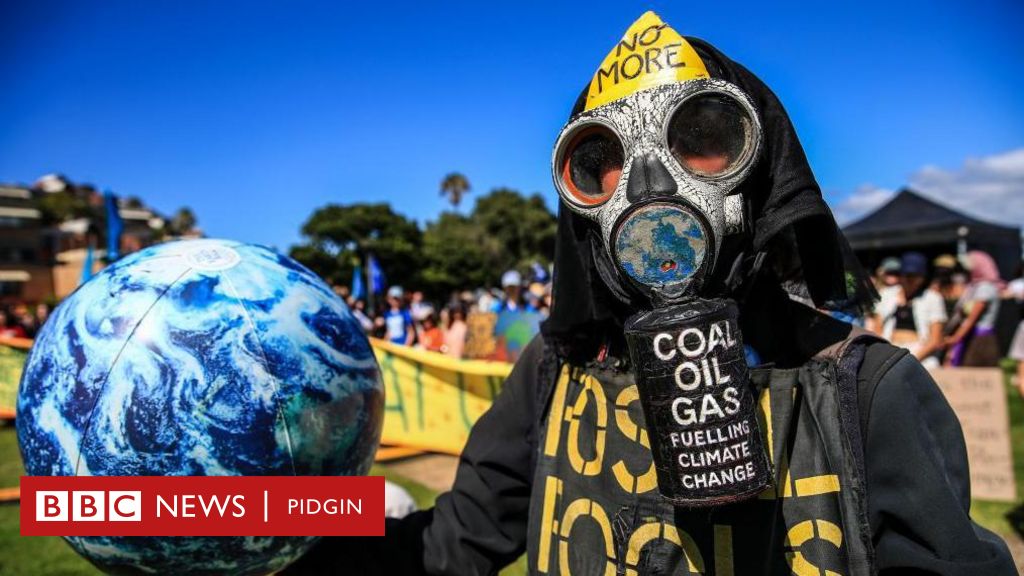Wia dis foto come from, Getty Images
- Author, Georgina Rannard and Esme Stallard
- Role, BBC climate reporters
- Reporting from In Baku
-
Richer kontris don promise to increase dia funds to help poor kontris fight climate change.
Di rich kontris raise di money wey dem dey give poor kontris to $300bn (£238bn) a year wey be record, but di developing nation no dey happy wit dis amount.
Tori be say di tok-tok for di UN climate summit COP29 for Azerbaijan reach almost 33 hours, and na small tin remain e for collapse.
Dis agreement fall short of di $1.3tr wey developing kontris bin dey push for. Di African Group of Negotiators describe di final pledge as “too little, too late”, while di representative from India bin dismiss di money as “a small sum”.
But afta two weeks of some bitter negotiations for Azerbaijani capital, Baku, poor nations no stand in di way of a deal.
Di promise of more money na to recognise say di developing nations dey bear unfair burden from climate change, but also historically dem dey contribute di least to climate change.
Di head of di UN climate body, Simon Stiell, accept say di agreement dey far from perfect.
“No kontri dey get eviritin dem want, and we dey leave Baku wit a mountain of work still to do,” im write for statement.
Dem announce di deal by 03:00 local time on Sunday (23:00 GMT on Saturday). As well as $300bn (£238bn) a year by 2035, wit promises and efforts to raise $1.3tn a year from both public and private sources by dat date.
Di announcement come wit cheers and applause, but one hot speech from India show say serious frustration still dey.
“Di amount wey dem dey propose to mobilise dey very poor. Na chikini money,” Leela Nandan tell di conference.
Di chairpesin of di Alliance of Small Island States, Cedric Schuster, say: “Our islands dey sink. How you expect us to go back to di women, men, and children of our kontris wit dis poor deal?”.
Di funds wey dem pledge na to help poorer kontries move away from fossil fuels and invest in renewable energy like wind and solar power.
Dem also show commitment to triple di money wey go towards preparing kontris for climate change. Historically, only 40% of di funding wey dey available for climate change don go towards dis.
Dis year – wey now “dey virtually certain” to be di warmest on record – dey affected sake of di intense heatwaves and deadly storms.
Di election of US President Donald Trump, wey go take office for January na im bin dominate di opening of di tok-tok on 11 November.
Trump get double mind on dis climate mata, im tok say im go comot US out of di landmark Paris agreement wey for 2015 create roadmap for nations to tackle climate change.
“For sure, e bring di headline number down. Di oda developed kontris donors dey very aware say Trump no go pay a penny and dem go need to make up for di shortfall,” Prof Joanna Depledge, wey be expert on international climate negotiations for Cambridge University, tell BBC.
Reaching dis deal na sign say kontris still dey committed to working togeda on climate, but wit di largest economy on di planet now wey dey unlikely to play a part, e go hard well-well to meet di multi-billion dollar goal.
“The long end game for COP29 show di harder geopolitical terrain wey di world find itself in. Di result na flawed compromise between donor kontris and di most vulnerable nations for di world,” na so Li Shuo from di think-tank Asia Society Policy Institute tok.
UK Energy Secretary Ed Miliband say di new pledge no commit UK to come up wit more climate finance but actually na “huge opportunity for British businesses” to invest for oda markets.
“No be eviritin wey we or odas want but na step forward for all of us,” e tok.
In return for promising more money, developed nations including di UK and di European Union want stronger commitments from kontris to reduce use of fossil fuels.
Despite dia hopes on di agreement wey dem reach for dia tok-tok for Dubai last year to “transition away from fossil fuels” to dey strong, di final proposed agreement repeat am again.
For many nations, dis no dey good enough, and dem reject am – so now, na next year dem go agree on di mata next year.
Tori be say kontris wey dey rely on oil and gas exports put up a strong fight during negotiations to stop further progress.
“The Arab Group no go accept any text wey target specific sectors, including fossil fuels,” Saudi Arabia Albara Tawfiq tok dis one for open meeting earlier dis week.

Wia dis foto come from, Sean Gallup/Getty Images
Several nations bin come di meeting wit new plans to address climate change for dia own kontris.
Prime Minister Keir Starmer tok on climate leadership on di world stage and pledge to reduce UK emissions by 81% by 2035, many celebrate as an ambitious goal.
Di host nation, Azerbaijan, na a controversial choice for climate toks. Dem say dem wan expand gas production by up to a third in di next decade.
Many see Brazil as a better choice to host next year climate summit, COP30, for di city of Belém becos of President Lula strong commitments to climate change and reducing deforestation for di globally important Amazon rainforest.


